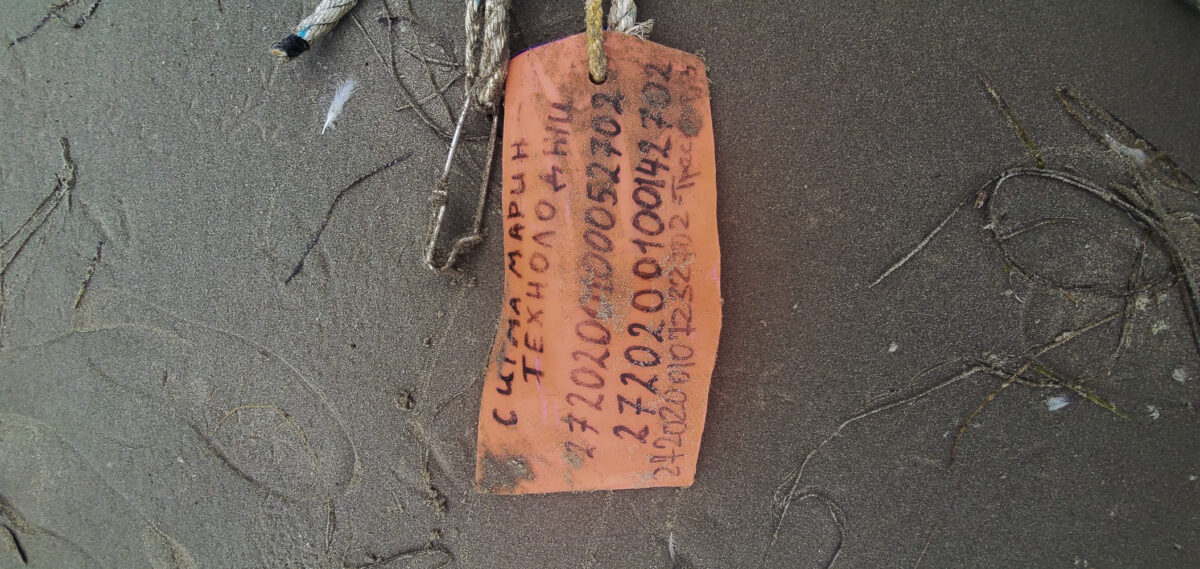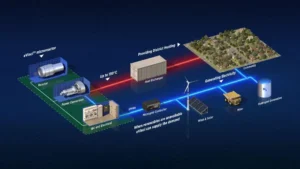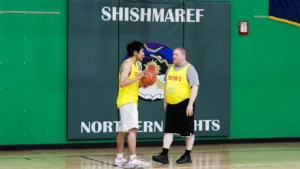In late July, foreign debris began to wash up on Bering Strait shores. Almost three months later, the National Oceanic Atmospheric Administration (NOAA) and local groups are working together to determine which vessel is the source of the trash.
The novel event has left large amounts of Russian and Korean packaging, produce, and fishing products washed up on beaches in Western Alaska. Austin Ahmasuk, Kawerak’s Marine Advocate, says that there have been fewer reports of the trash in recent months, but they are still coming in. In September, there were over twenty pieces of foreign debris reported.
“There’s been reports as late as the 29th of September, first of October. There are reports still going in, still being catalogued.”
– Austin Ahmasuk, Kawerak Marine Advocate
Peter Murphy, Regional Coordinator for NOAA, recently shared some of the efforts that the federal agency is taking to research and combat this event, including forming an ad hoc task force with leaders from local groups.
“NOAA has been cooperating with other federal agencies, state agencies, but also very importantly the local groups to kind of talk through and share information on what has been going on. We’re also working on connecting with the communities who have been the most impacted to try to understand what their needs are and ways we can provide direct support. We’re continuing to work with Gambell and Savoonga, as well as contacts in the Nome area, on ways we can try to directly help.”
– Peter Murphy, NOAA Marine Debris Program Regional Coordinator
A piece of trash, found on September 21 by Wales community member Robert Tokeinna Jr, might provide some insight into how the debris ended up on Bering shores. Attached to the debris was a tag from a Russian fishing company. Murphy says that NOAA is working with the USCG and NOAA International Office of Affairs to communicate with Russia on this issue.
“There’s formal structures that we need to go through for international engagement. We’re pursuing those and reaching out through those to identify the best contacts within the Russian government to make those connections and try to understand.”
– Peter Murphy, NOAA Marine Debris Program Regional Coordinator

This novel event is just one of many environmentally-damaging changes in the Bering Strait Region; and while this episode might be a one-time dumping of debris, it could likely happen again. Ahmasuk says that this pulse of trash emphasizes Western Alaska’s need for funding and resources for cleanup.
“There needs to be some sort of fair, equitable response program in rural Alaska. We simply don’t have that. There also needs to be a really strong, really good international collaboration to ensure that this doesn’t [happen] again. There needs to be some sort of enforcement capability. Right now, that seems to be really lacking… some way to force or fine the bad actors.”
– Austin Ahmasuk, Kawerak Marine Advocate
Kawerak plans on sending a proposal to the Alaska Federation of Natives to bring more awareness and action to this issue. The proposal will be released within the next few weeks.
In the meantime, Bering Strait residents have continued to be the first responders to this novel event by reporting debris sightings. Gay Sheffield, with Alaska Sea Grant, emphasized the importance of and the need for these community-led efforts and individual reports, no matter how trivial they may seem.
“This trash coming in is a crime. Every time a community member snaps a photo and reports it, they’re providing a clue. Every time you send in a photo or report whatever you see, even if you think it’s not important, each one of those photos, each one of those reports is building a case. It is incredibly helpful to document this and get your clue in for this event.”
– Gay Sheffield, Alaska Sea Grant
If you would like to report foreign trash or various marine debris found in the Bering Strait region, you can call Gay Sheffield at 434-1149, Austin Ahmasuk at 434-0962, or NOAA’s Marine Debris Program at 206-526-4661.
Image at top: A fishing tag found on the beach in Wales in late September. Photo taken by Robert Tokeinna Jr of Wales, shared by Gay Sheffield of the Alaska Sea Grant (2020).





